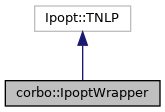#include <nlp_solver_ipopt_wrapper.h>
|
| | IpoptWrapper (SolverIpopt *solver) |
| |
| void | setOptimizationProblem (OptimizationProblemInterface &problem) |
| |
| virtual | ~IpoptWrapper () |
| |
|
| bool | get_nlp_info (Index &n, Index &m, Index &nnz_jac_g, Index &nnz_h_lag, IndexStyleEnum &index_style) override |
| |
| bool | get_bounds_info (Index n, Number *x_l, Number *x_u, Index m, Number *g_l, Number *g_u) override |
| |
| bool | get_starting_point (Index n, bool init_x, Number *x, bool init_z, Number *z_L, Number *z_U, Index m, bool init_lambda, Number *lambda) override |
| |
| bool | eval_f (Index n, const Number *x, bool new_x, Number &obj_value) override |
| |
| bool | eval_grad_f (Index n, const Number *x, bool new_x, Number *grad_f) override |
| |
| bool | eval_g (Index n, const Number *x, bool new_x, Index m, Number *g) override |
| |
| bool | eval_jac_g (Index n, const Number *x, bool new_x, Index m, Index nele_jac, Index *iRow, Index *jCol, Number *values) override |
| |
| bool | eval_h (Index n, const Number *x, bool new_x, Number obj_factor, Index m, const Number *lambda, bool new_lambda, Index nele_hess, Index *iRow, Index *jCol, Number *values) override |
| |
|
| OptimizationProblemInterface * | _problem = nullptr |
| |
| SolverIpopt * | _solver = nullptr |
| |
| void | finalize_solution (SolverReturn status, Index n, const Number *x, const Number *z_L, const Number *z_U, Index m, const Number *g, const Number *lambda, Number obj_value, const IpoptData *ip_data, IpoptCalculatedQuantities *ip_cq) override |
| |
| void | precompute1stOrderDerivatives () |
| |
Definition at line 41 of file nlp_solver_ipopt_wrapper.h.
◆ Index
◆ IpoptCalculatedQuantities
◆ IpoptData
◆ Number
◆ SolverReturn
◆ IpoptWrapper()
| corbo::IpoptWrapper::IpoptWrapper |
( |
SolverIpopt * |
solver | ) |
|
|
explicit |
◆ ~IpoptWrapper()
| virtual corbo::IpoptWrapper::~IpoptWrapper |
( |
| ) |
|
|
virtual |
◆ eval_f()
| bool corbo::IpoptWrapper::eval_f |
( |
Index |
n, |
|
|
const Number * |
x, |
|
|
bool |
new_x, |
|
|
Number & |
obj_value |
|
) |
| |
|
override |
Method to return the objective value
◆ eval_g()
Method to return the constraint residuals
◆ eval_grad_f()
| bool corbo::IpoptWrapper::eval_grad_f |
( |
Index |
n, |
|
|
const Number * |
x, |
|
|
bool |
new_x, |
|
|
Number * |
grad_f |
|
) |
| |
|
override |
Method to return the gradient of the objective
◆ eval_h()
| bool corbo::IpoptWrapper::eval_h |
( |
Index |
n, |
|
|
const Number * |
x, |
|
|
bool |
new_x, |
|
|
Number |
obj_factor, |
|
|
Index |
m, |
|
|
const Number * |
lambda, |
|
|
bool |
new_lambda, |
|
|
Index |
nele_hess, |
|
|
Index * |
iRow, |
|
|
Index * |
jCol, |
|
|
Number * |
values |
|
) |
| |
|
override |
Method to return: 1) The structure of the hessian of the lagrangian (if "values" is NULL) 2) The values of the hessian of the lagrangian (if "values" is not NULL)
◆ eval_jac_g()
Method to return: 1) The structure of the jacobian (if "values" is NULL) 2) The values of the jacobian (if "values" is not NULL)
◆ finalize_solution()
| void corbo::IpoptWrapper::finalize_solution |
( |
SolverReturn |
status, |
|
|
Index |
n, |
|
|
const Number * |
x, |
|
|
const Number * |
z_L, |
|
|
const Number * |
z_U, |
|
|
Index |
m, |
|
|
const Number * |
g, |
|
|
const Number * |
lambda, |
|
|
Number |
obj_value, |
|
|
const IpoptData * |
ip_data, |
|
|
IpoptCalculatedQuantities * |
ip_cq |
|
) |
| |
|
override |
This method is called when the algorithm is complete so the TNLP can store/write the solution
◆ get_bounds_info()
Method to return the bounds for my problem
◆ get_nlp_info()
| bool corbo::IpoptWrapper::get_nlp_info |
( |
Index & |
n, |
|
|
Index & |
m, |
|
|
Index & |
nnz_jac_g, |
|
|
Index & |
nnz_h_lag, |
|
|
IndexStyleEnum & |
index_style |
|
) |
| |
|
override |
Method to return some info about the nlp
◆ get_starting_point()
Method to return the starting point for the algorithm
◆ precompute1stOrderDerivatives()
| void corbo::IpoptWrapper::precompute1stOrderDerivatives |
( |
| ) |
|
◆ setOptimizationProblem()
◆ _problem
◆ _solver
The documentation for this class was generated from the following file:
